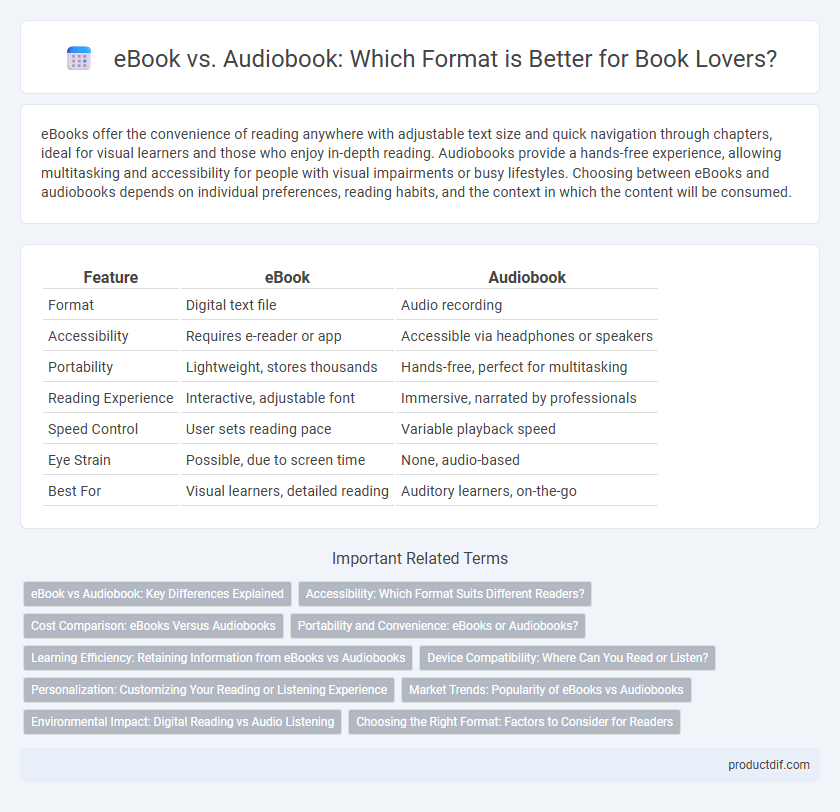eBooks offer the convenience of reading anywhere with adjustable text size and quick navigation through chapters, ideal for visual learners and those who enjoy in-depth reading. Audiobooks provide a hands-free experience, allowing multitasking and accessibility for people with visual impairments or busy lifestyles. Choosing between eBooks and audiobooks depends on individual preferences, reading habits, and the context in which the content will be consumed.
Table of Comparison
| Feature | eBook | Audiobook |
|---|---|---|
| Format | Digital text file | Audio recording |
| Accessibility | Requires e-reader or app | Accessible via headphones or speakers |
| Portability | Lightweight, stores thousands | Hands-free, perfect for multitasking |
| Reading Experience | Interactive, adjustable font | Immersive, narrated by professionals |
| Speed Control | User sets reading pace | Variable playback speed |
| Eye Strain | Possible, due to screen time | None, audio-based |
| Best For | Visual learners, detailed reading | Auditory learners, on-the-go |
eBook vs Audiobook: Key Differences Explained
eBooks offer customizable reading experiences with adjustable fonts, annotations, and offline access, enhancing user control over content consumption. Audiobooks provide hands-free engagement through narrated storytelling, ideal for multitasking and auditory learners. Both formats cater to different preferences, with eBooks emphasizing visual interaction and audiobooks focusing on immersive audio delivery.
Accessibility: Which Format Suits Different Readers?
eBooks offer flexible accessibility features such as adjustable font sizes and text-to-speech options, making them suitable for readers with visual impairments or learning disabilities. Audiobooks provide hands-free access, ideal for multitasking readers and those with limited mobility or reading difficulties like dyslexia. Both formats cater to diverse preferences and needs, enhancing reading accessibility across various user groups.
Cost Comparison: eBooks Versus Audiobooks
eBooks generally offer a more affordable option compared to audiobooks, with prices often ranging between $0.99 and $15 depending on the title and platform. Audiobooks tend to cost more due to production expenses, including narration and sound editing, often priced between $10 and $30 or higher for popular releases. Subscription services like Audible and Kindle Unlimited provide cost-effective access to both formats, but individual audiobook purchases typically remain pricier than individual eBooks.
Portability and Convenience: eBooks or Audiobooks?
eBooks offer unparalleled portability by storing thousands of titles on a single device, making it easy for readers to carry an entire library wherever they go. Audiobooks provide convenience through hands-free listening, perfect for multitasking during commutes, workouts, or household chores. Both formats enhance accessibility, but eBooks excel in searchable text and quick navigation, while audiobooks deliver immersive narration and the ability to enjoy literature without screen time.
Learning Efficiency: Retaining Information from eBooks vs Audiobooks
Research shows that eBooks enhance learning efficiency by allowing readers to highlight, annotate, and easily review text, which aids in information retention. Audiobooks support multitasking and improve comprehension through tone and inflection but may result in lower retention without active engagement. Studies indicate that combining reading eBooks with listening to audiobooks can optimize memory retention and deepen understanding of complex material.
Device Compatibility: Where Can You Read or Listen?
eBooks offer compatibility across various devices, including eReaders like Kindle, tablets, smartphones, and computers, providing flexible reading environments. Audiobooks are accessible on smartphones, tablets, computers, and dedicated audiobook players, supporting multitasking with audio playback. Both formats integrate with popular apps such as Audible, Apple Books, and Google Play Books, ensuring seamless access across platforms.
Personalization: Customizing Your Reading or Listening Experience
eBooks offer customizable text size, font styles, and background colors to enhance visual comfort, while audiobooks provide adjustable playback speeds and immersive narration options to suit individual listening preferences. Both formats support personalized bookmarks and note-taking features, enabling users to tailor their experience according to their learning style and convenience. Advanced eReaders and audiobook apps incorporate synchronization across devices, ensuring seamless transition between reading and listening without losing progress.
Market Trends: Popularity of eBooks vs Audiobooks
The eBook market maintains steady growth driven by convenience and accessibility, with global revenue expected to surpass $20 billion by 2025. Audiobooks, however, exhibit faster expansion, fueled by increasing smartphone usage and subscription services such as Audible, projecting a compound annual growth rate (CAGR) of over 25% through 2027. Consumer preferences reveal a rising shift towards multitasking-friendly audiobooks, especially among younger demographics, while eBooks remain favored for in-depth reading experiences.
Environmental Impact: Digital Reading vs Audio Listening
eBooks reduce paper consumption, significantly lowering deforestation rates compared to traditional books, while audiobooks require electronic devices that consume energy during production and usage. The carbon footprint of streaming or downloading audiobooks often surpasses that of eBooks stored locally due to continuous data transmission. Choosing eBooks over audiobooks can minimize environmental impact by reducing energy consumption and resource depletion associated with digital listening platforms.
Choosing the Right Format: Factors to Consider for Readers
Choosing between eBooks and audiobooks depends on individual reading preferences, lifestyle, and context of use. eBooks offer customizable text size, easy navigation, and visual engagement, ideal for readers who prefer active reading and annotation. Audiobooks provide hands-free convenience and emotional narration, making them a great choice for multitaskers and auditory learners.
eBook vs Audiobook Infographic

 productdif.com
productdif.com